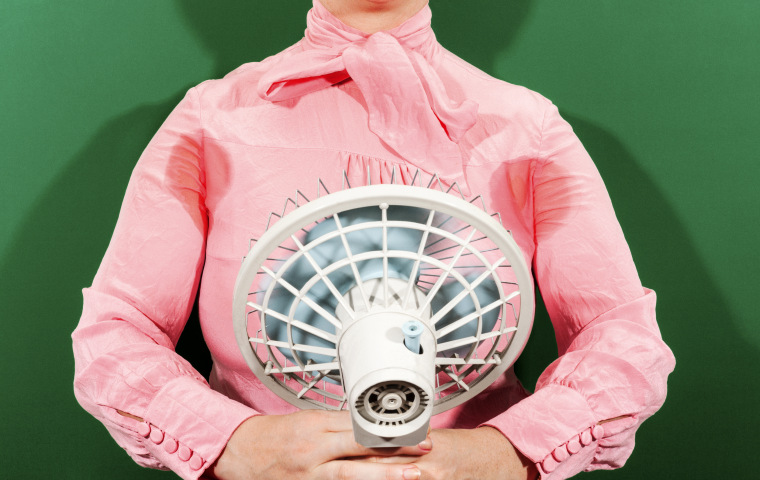Ask your mom, ask your sister, ask your medical provider or even ask Dr. Google what you can come to expect from your body as it ages into never having another period, and then gird your loins for a nondefinitive answer. Why? Because apparently it’s a bit of guesswork.
Are my night sweats or suddenly geyser-like periods or hair-trigger mood swings or my insomnia or vaginal dryness symptoms of … perimenopause? Probably. Maybe. Maybe not. How long does this go on? It can last anywhere from two months to 10 years or maybe more, if you're even having it at all.
Unfortunately, while there has been a fair amount of research on menopause, perimenopause — the tumultuous hormonal transition as our periods wrap it up — is largely unstudied, according to Menopause: The Journal of the North American Menopause Society, and thusly broadly not understood.
The "Baroness von Sketch Show" — a Canadian feminist comedy series created by a hilarious quartet of 40-somethings — parodied the studied lack of studies recently, showing a woman (Carolyn Taylor) experiencing an apparent hot flash while out to lunch with a friend (Jennifer Whalen), though she isn’t sure that’s what it is. “Maybe it’s perimenopause,” her friend suggests. “You think?” the woman asks.
The question of whether she's experiencing perimenopause is batted around as the woman reveals to friends and family a host of minor symptoms, like memory loss, insomnia and rampant mood swings, before ending up at her doctor. Even the doctor doesn’t know whether her symptoms are perimenopause, telling her with a shrug that, if they are, what limited research exists says it could last up to 10 years, but he adds, “Who really cares anyway?”
I laughed in horror and recognition, and, after posting the sketch on social media, my friends responded immediately with funny, brutal anecdotes about their experiences not only with perimenopause, but with the medical establishment. Because, after all, we’re used to this, aren’t we? From the moment we start getting our periods, the best most doctors can (or will) do for us is shrug and tell us some version of, "This is how it goes."
I was 13 when I started menstruating, and had received most of my puberty intel from Judy Blume’s fictional menstruator Margaret Simon and a fellow errant kid in the principal’s office — which is to say, I half-knew what to expect beforehand. But when it finally happened, all I immediately needed to know was how long I’d have to endure it, because, in those days leading up to freshman year, I was writhing in crampy pain. My first period lasted for a total of three weeks; most of the ones after that were like a sinister Hanukkah, going on for a full eight days.
I remember asking my mother when menopause would start, thinking it would put an end to my misery. She warned that it wasn’t that simple — she wasn’t kidding — but she also didn't go into details. (Of course, at 35, she might not have had them to share.) I thought, It can’t be worse than this.
I never got used to the cramps, and every month my period arrived like a surprise, since, as a lesbian, it never dawned on me to track it given that unexpected pregnancies weren't a concern. Now that I’m staring 50 in the face, things are completely out of whack, so the surprise aspect isn’t so weird; I feel validated in never having counted on it coming at a certain time.
But I still feel put out that it won't stick to a schedule, because, as with an unwelcome houseguest, I never know when it’s going to arrive — or leave. A colleague of mine, who is several years older, says, “What’s really fun is when your period disappears for a few months and you think it’s gone for good, only to waltz back in like it never left.” And always — always! — after you stop buying, well, Always.
But I haven’t suffered the worst of it. One friend, also 49, told me that her doctor had told her perimenopause could last 10 years; she burst into tears. Another friend, now 50, remembers that when she stopped menstruating at 40, three years after having her third child, she asked her then-doctor whether she was in menopause. “She belittled me, made me feel a fool for asking how to diagnose it," my friend said. "After a bit of back and forth, she finally informed me of a blood test that my insurance covered.” The result: My friend was post-menopausal.
A college friend shared that she’s been going through perimenopause, describing it as “four years and counting of hot flashes, sleeplessness, fogginess, plus a 25-pound weight gain.” What’s worse, she said, is that because of her medical history, she can’t take hormone-replacement therapy, which can relieve some of the more egregious physical symptoms, but also puts some at risk for stroke, blood clots, heart disease and cancer, according to the Mayo Clinic.
Last year, I asked my gynecologist whether I was perimenopausal; she didn’t think so, and was also puzzled when I looked deflated. It wasn’t just that I was confused by my body’s changes, though. As eager as Margaret Simon was to menstruate in Judy Blume's book, I was desperate to stop doing so. Sure, I miss my youth: I definitely miss my metabolism, and what remains of it will leave with my final period. But I won’t miss the mood swings, the cramps, the mess.
In fact, the only thing I am missing as my reproductive cycle winds down — what any of us are missing — is that definitive answer to the question: “Am I?”




